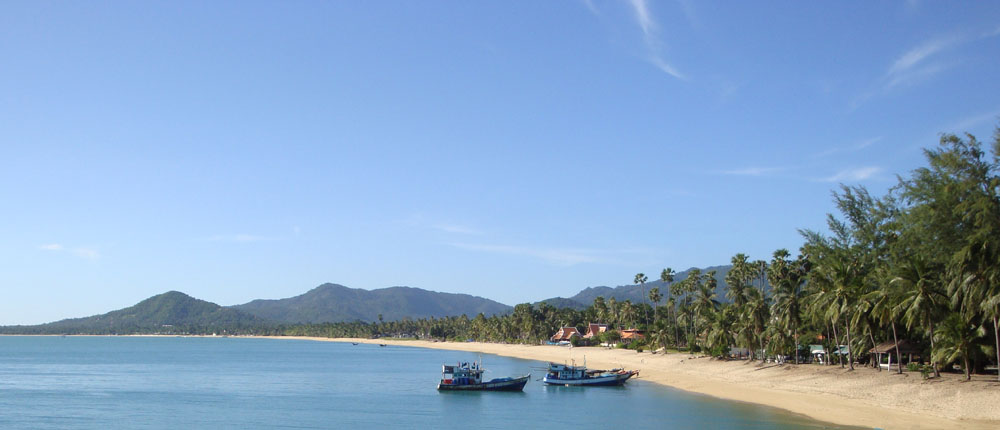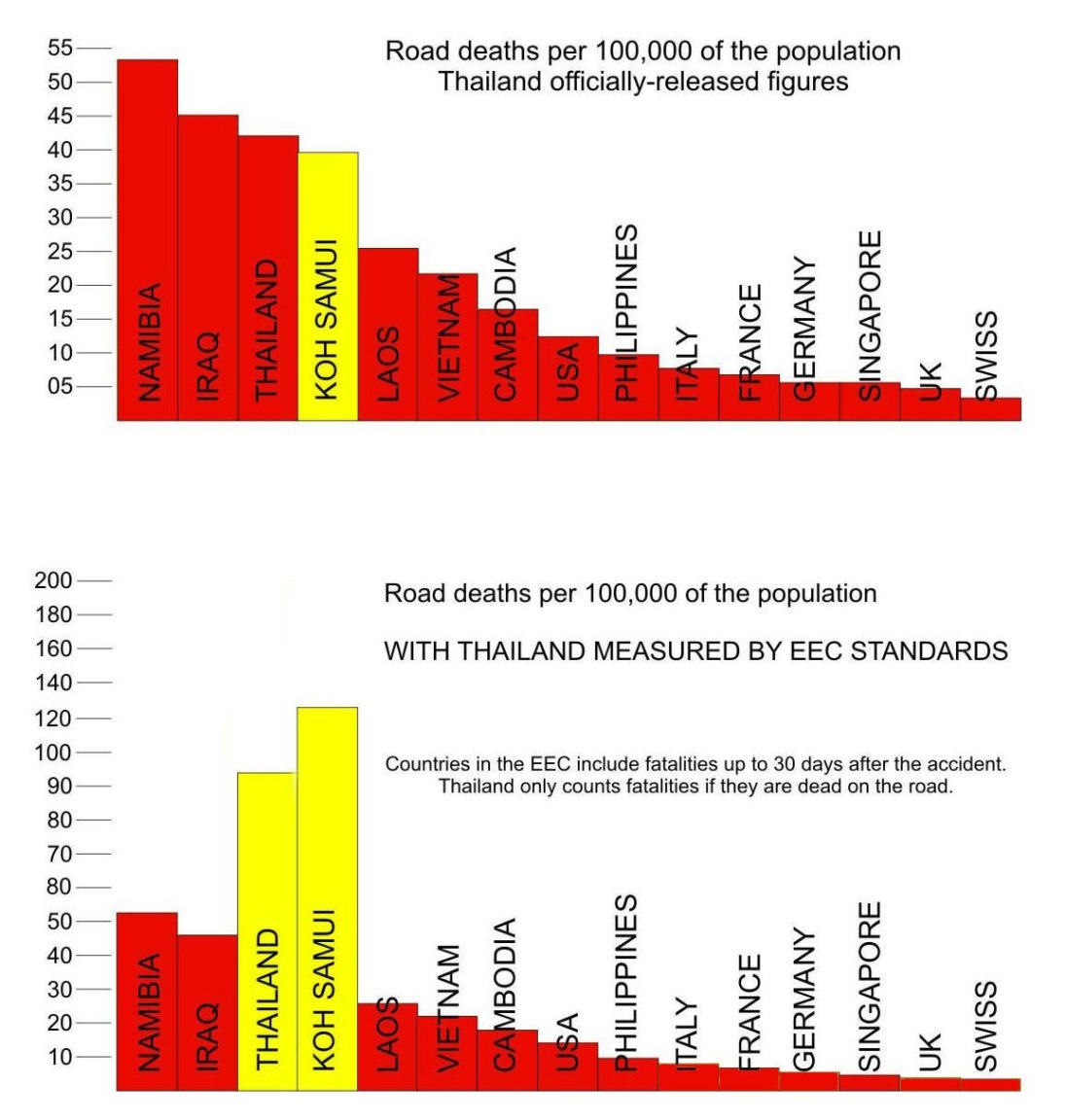-
Posts
12,522 -
Joined
-
Last visited
Content Type
Events
Forums
Downloads
Quizzes
Gallery
Blogs
Everything posted by khunPer
-
How do you know? The number of road deaths counted pr. 100,000 population variates in Thailand, depending on how you count, as some statistics only counts died on the spot as death, while others includes people that died at hospital; for some countries that period is up to 30 days after the road accident. The official Thai traffic deaths pr. 100,000 population is around 35, which for Samui would be 3 per month. Back when we had printed weekly or fortnightly local newspapers giving monthly status from the police, the official statement for Samui was 2-4 traffic deaths per month, which fit with the overall statistics. Some years back one of the local news media and some expats tried to start a road safety group. It was said that counted by EEC standards – death up to 30 days after the accident – Thailand would have about 90 road deaths per 100,000 population, and Samui around 120, which is 10 per month. The graphic below originates from the days when we worked on establishing the group...
-

ED Visa + Owning a Thai Company
khunPer replied to changthenomad's topic in Thai Visas, Residency, and Work Permits
You can perform high level director duties; i.e. attend board meetings and sign documents and annual statement, but you cannot do any physical work. -

Money from abroad
khunPer replied to Mika78's topic in Jobs, Economy, Banking, Business, Investments
The bank will most likely not withhold any tax, but they might report foreign transfers, which is easily possible with datasystems. In my Scandinavian home country the taxman has for years known all about the people's financial transactions; we don't even need to make a tax return, everything is already known and will be taxed... -

Money from abroad
khunPer replied to Mika78's topic in Jobs, Economy, Banking, Business, Investments
It might change this year with the new tax-rule for foreign transfers from 1st January 2024; however, we are still missing details about how it will work. -

Rise of the Machines (ATM's)
khunPer replied to Tropicalevo's topic in Koh Samui, Koh Phangan, Koh Tao
Doesn't help if it's SCB and not on a Friday. The ATM digested my SCB card in front of the SCB branch in Central. I went inside and a member of the staff had the key and was ready to get out and find my card. However, the branch manager saw it and stopped him, saying that they only open the ATM on Fridays – unfortunately it was Tuesday, so I had to come back after Friday with my passport to collect my card... -

How many millions of baht does one need to retire in Pattaya?
khunPer replied to advancebooking's topic in Pattaya
That sounds fair enough, if he heads for the affordable P&P-ladies and don't let some move in... -

Kasikorn Bank Branch closure.
khunPer replied to phetphet's topic in Koh Samui, Koh Phangan, Koh Tao
Digital online era-progress... -
I would presume making a last will at the amphor office is the way, in where you state that you wish your body to be burned and what to do with the ashes. Make a separate bank account with a deposit for the costs – name it in the will – and donate whatever left of assets in Thailand to the temple, where your body is burned.
-

Kasikorn Bank Branch closure.
khunPer replied to phetphet's topic in Koh Samui, Koh Phangan, Koh Tao
The banks want their customers to be online, they seems to think that bad physical service is the way. In the future there will be one Samui-branch – probably in Nathon – for each bank and an office in a central mall for limited service. Bangkok Bank has already changed name of the Nathon Branch to Samui Branch – I had to change my paper slip the other day, because I wrote "Nathon" as branch, it should be "Samui"... -
A place with a beer volcano and a stripper factory... "The Pastafarian conception of Heaven includes a beer volcano and a stripper (or sometimes prostitute) factory. The Pastafarian Hell is similar, except that the beer is stale and the strippers have sexually transmitted diseases." Source link HERE.
-
As I wrote, it is depending of you nationality and different laws in different countries; inheritance is not simple. That is why to last wills can be very important, as advised by Thai lawyers. I believe my government and the law more than a lawyer, and my government says clearly: "When a person dies, it is the authorities of the country where the deceased was resident that handles the estate."
-
My source is a Danish lawyer that are expert in Thai law, and the Danish government (link below). I was also surprised, but if you think about it, it makes sense. You can only have residence in one country – i.e. the country where you spend most of your time – and that country will handle the estate. It's not the country that one dies in that handles the estate, but the country of domicile; if you are on holiday in Thailand, but domiciled in UK, your estate will be handled in UK. If you for example have dual citizenship, it's the country of residence that handles the estate. However, there are exceptions, such as non moveable real estate, which will be handled by the rules of the country, where the real estate is. A foreigner can for example inherit Thai land from a Thai spouse, but cannot own the land – i.e., needs to sell or transfer the land within a certain period – even if the spouse lives and die in another country, where real estate can be inherited... "The rules for inheritance and probate differ from country to country. In some countries, the switch takes place in the country where the values are located. This applies regardless of where the deceased lived. Real estate often has to be exchanged in the country where the property is located." (Source link below.) Inheritance can be complex, but in general, this is the principle. If you leave UK and settle in Thailand, then Thailand is your country of residence. Some countries might not acknowledge wills from other countries – again, think of for example real estate – which is why lawyers recommend to make separate wills for assets in separate countries. Different countries have different national rules, so you might be able to apply for an estate to be handled by country of citizenship, instead of country of residence. Country of residence can de be defined by... Where the person themselves or the person's household have their permanent home Where a person's belongings are usually located Where the person resides when the person is not temporarily residing elsewhere (e.g. due to vacation, study or business trip, illness or imprisonment) Link to Danish governmental source (you can use browser og Google translate) HERE.
-
A pharmacy. Small bottles comes in 3%. Larger bottles (circa 450 ml) comes in 3% and 6%. 1 liter bottles normally needs to be ordered and can come in food grade, 35% to 50%.
-
You can get the forms in advance from the service window on the ground floor – they normally dont accept any other forms than their own printed versions. I once filled in everything from home using downloads, I had to redo it all at the immigration office in their forms. Now I come a day, or a few days, in advance and collect the form.
-

Where to park the 800,000 THB?
khunPer replied to Hanaguma's topic in Thai Visas, Residency, and Work Permits
12 month fixed bank account, pays at the moment about 1.6 percent per annum. I cash the interest every year – after 15% withholding tax – and leaves a clean 800k baht in the account for extension of stay purpose. -

Exemptions under the new tax laws?
khunPer replied to Presnock's topic in Jobs, Economy, Banking, Business, Investments
Valid DTAs are still valid; many covers retirement pension taxation. -
Yes, and that is advised by the Thai lawyers that wrote the book "Thai Law For Foreigners". Make one will in Thailand for one's belongings in Thailand, following the Thai law and custom; and another will for belongings in one's home country following the law and customs there. However, be aware of that it's a court in the country where you have your primary home (lives), which will handle the estate of both wills, no matter where you die. I made two will, one in Thailand and another in m y home country. I wrote in both that there is another will covering assets in the other country.
-

Buying a condo as a long term rental
khunPer replied to mrblonde's topic in Real Estate, Housing, House and Land Ownership
If you are making a business with more than one condo, you might need to do it from a Thai company limited. You shall pay tax of the income. I wouldn't do that, just buy the one condo I need for myself. There are (plenty) of other ways to make an income from savings with lower risk factor risk than property in Thailand, when looked at as an investment.







